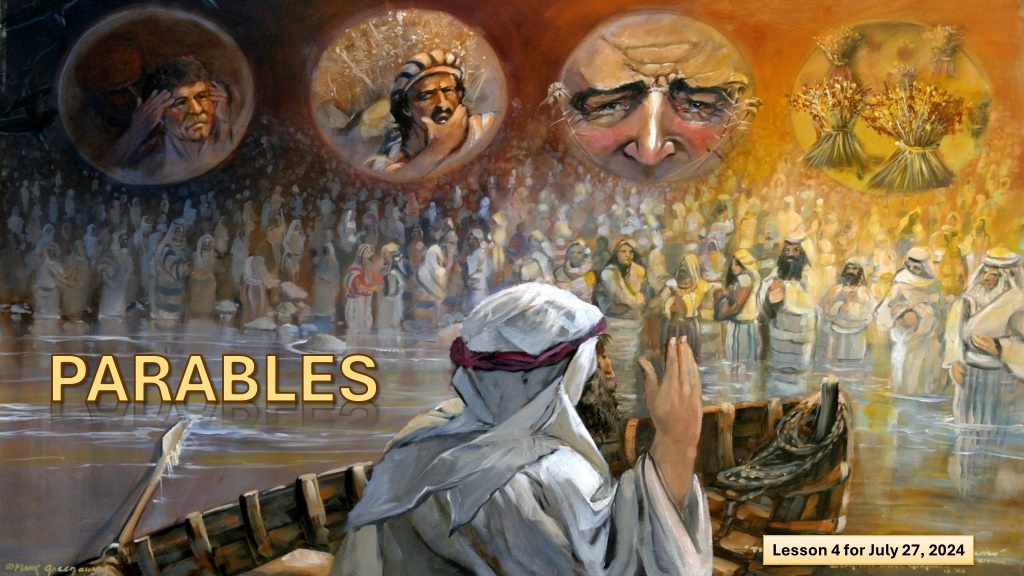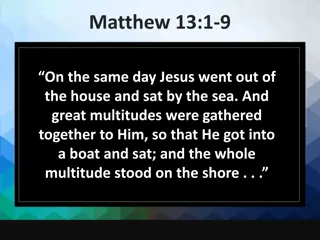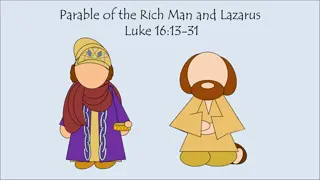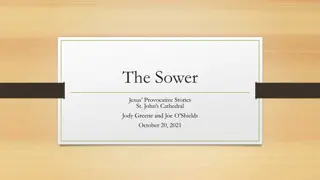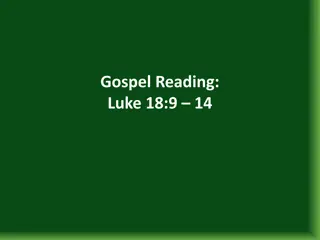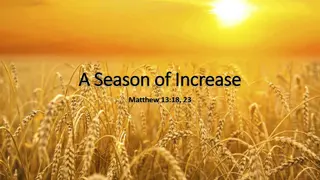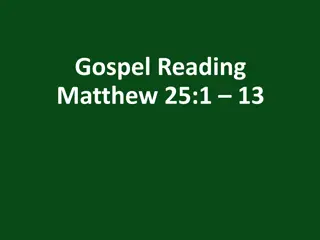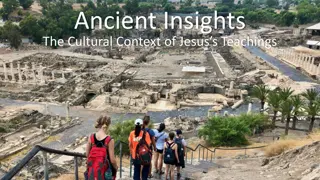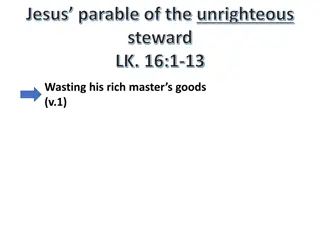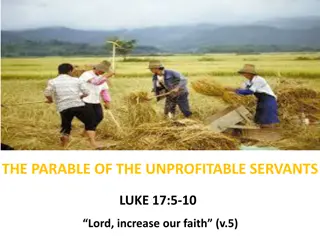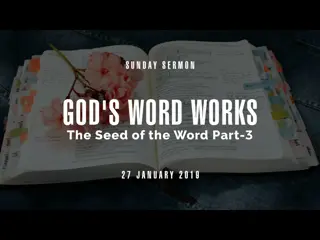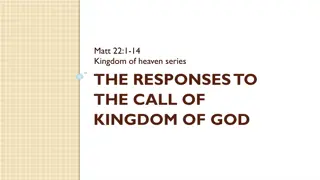Understanding the Parable of the Sower and Its Lessons
Explore the profound teachings in the Parable of the Sower from Mark 4, focusing on the seed as the Word of God and the different types of soil representing our reception of it. Reflect on the importance of being receptive to God's Word to bear fruit and align with His Kingdom.
Download Presentation

Please find below an Image/Link to download the presentation.
The content on the website is provided AS IS for your information and personal use only. It may not be sold, licensed, or shared on other websites without obtaining consent from the author. Download presentation by click this link. If you encounter any issues during the download, it is possible that the publisher has removed the file from their server.
E N D
Presentation Transcript
PARABLES Lesson 4 for July 27, 2024
A parable is a narration of a fictional event (based or not on real events) from which an important truth or moral teaching is deduced by comparison or similarity. This is the system that Jesus primarily used in his teachings (Mark 4:34). His parables were generally taken from everyday life and, therefore, easy to remember and apply. When his listeners returned home, they shared what they learned with their family and friends.
they may be ever seeing but never perceiving, and ever hearing but never understanding; otherwise they might turn and be forgiven! (Mark 4:12) Jesus' preaching revolved around the Kingdom of Heaven (Mark 1:14-15). Many of his parables were told to explain the nature of said Kingdom (Mark 4:30). Interestingly, the reason Jesus himself gave for using parables is truly astonishing: lest they understand, or be converted, or be forgiven! (Mark 4:12). This was nothing new. When commanding him to preach, God told Isaiah: Hear well, and do not understand; see indeed, but do not understand. [ ] lest he see with his eyes, nor hear with his ears, nor understand with his heart, nor be converted, and there be healing for him ( Is. 6:9-10). He who hungers for the Word of God will hear the truth and rejoice. But those who do not want to hear, no matter how simple this truth is presented, will refuse to understand, to change, and to achieve salvation.
THE PARABLE OF THE SOWER
In a few days, the seed dies (Mark 4:4) In a few weeks, the seed dies (Mark 4:5-6) In the path between stones on good land among thorns At the end of the season, the seed bears fruit (Mark 4:8) In a few months, the seed dies (Mark 4:7) The sower and the seed do not vary. However, the result is totally different for each of the four terrains. It all depends on the way the seed is received.
The seed is the Word of God, and the sower is anyone who transmits it. They have no interest, and Satan leads them astray (Mark 4:15) They receive the word, but do not endure the trials (Mark 4:16-17) In the path between stones on good land among thorns They resist the tests and do not settle.They bear fruit (Mark 4:20) They receive the word, but they become comfortable (Mark 4:18-19) What type of soil am I? What should I do to be fruitful?
He said to them, Do you bring in a lamp to put it under a bowl or a bed? Instead, don t you put it on its stand? (Mark 4:21) Visualize the conversation: Do you bring in ? "No!"; don t you put it ?" "Well of course!" Jesus knew how to get the attention of his audience. Now they were ready to receive the spiritual lesson. Consider carefully what you hear, he continued. With the measure you use, it will be measured to you and even more (Mark 4:24). On the city streets, merchants sold their products using more or less standard measurements to gauge the amount of product the buyer wanted. If the seller was good, he would add a little more product to the measure to satisfy his customer. If someone is receptive to the truth, they will get even more. But if you reject it, even the truth you have will be lost (Mark 4:25). Little by little, Jesus revealed the truth of the gospel so that it would be known to all (Mark 4:22). That night, as they lit their lamps at home, those who have ears to hear (Mark 4:23) undoubtedly remembered the lesson.
He also said, This is what the kingdom of God is like. A man scatters seed on the ground (Mark 4:26) It is like a mustard seed, which is the smallest of all seeds on earth (Mark 4:31) The Kingdom of Heaven is comparable to a tiny mustard seed (Mark 4:30-31). Jesus remembers the cycle of grain growth (Mark 4:28): Grass After 50 days of sowing, mustard reaches 30-40 cm in height, and is already capable of producing harvestable fruit. It can grow up to 7 meters high (23 Ft.). Small, of course, was the beginning: 120 unlettered people hidden in a room in Jerusalem. But its expansion has reached the entire world, becoming the religion with the largest number of believers. Spike Grain It is a process that depends on God, not man (Mark 4:27). This is the seed of the gospel planted in the fertile soil of the believer. Through the action of the Holy Spirit we grow more and more in the truth... until Jesus comes (Mark 4:29; Mt. 13:39).
In parables and comparisons, He found the best method of communicating divine truth. In simple language, using figures and illustrations drawn from the natural world, He opened spiritual truth to His hearers, and gave expression to precious principles that would have passed from their minds, and left scarcely a trace, had He not connected His words with stirring scenes of life, experience, or nature. In this way He called forth their interest, aroused inquiry, and when He had fully secured their attention, He decidedly impressed upon them the testimony of truth. In this way He was able to make sufficient impression upon the heart so that afterward His hearers could look upon the thing with which He connected His lesson, and recall the words of the divine Teacher. EGW ( Fundamentals of Christian Education, 236)
